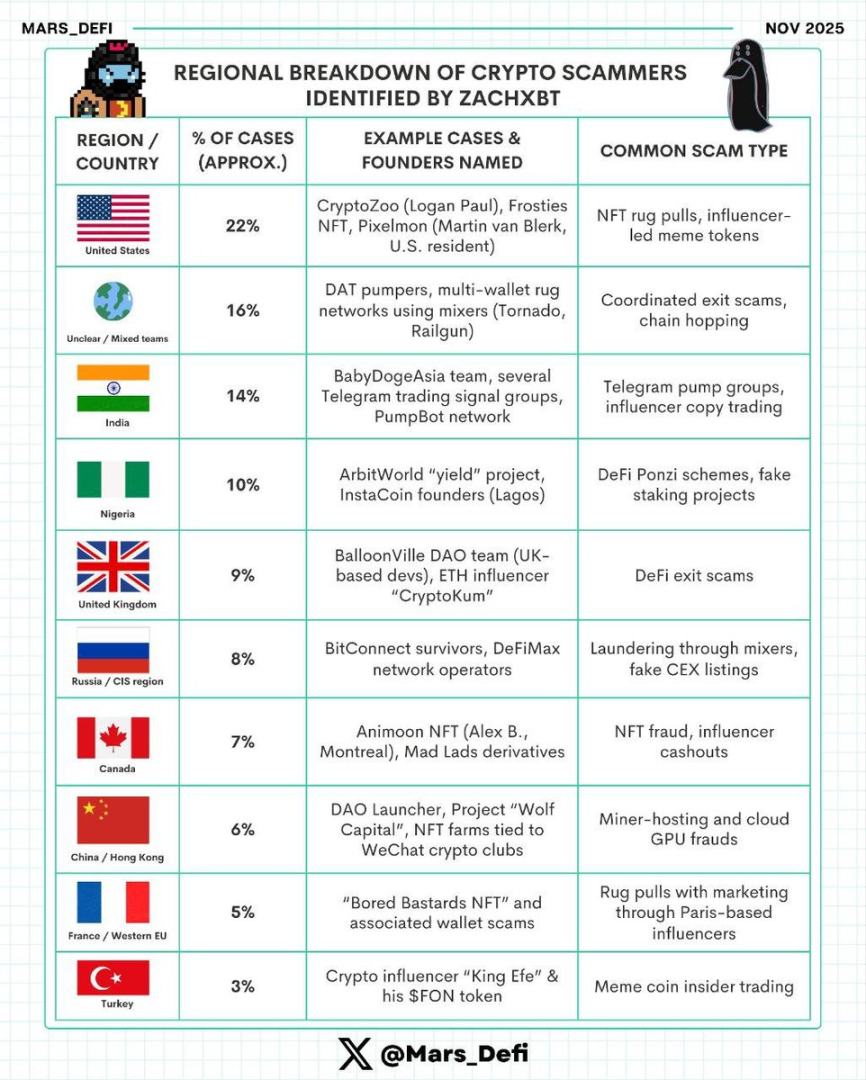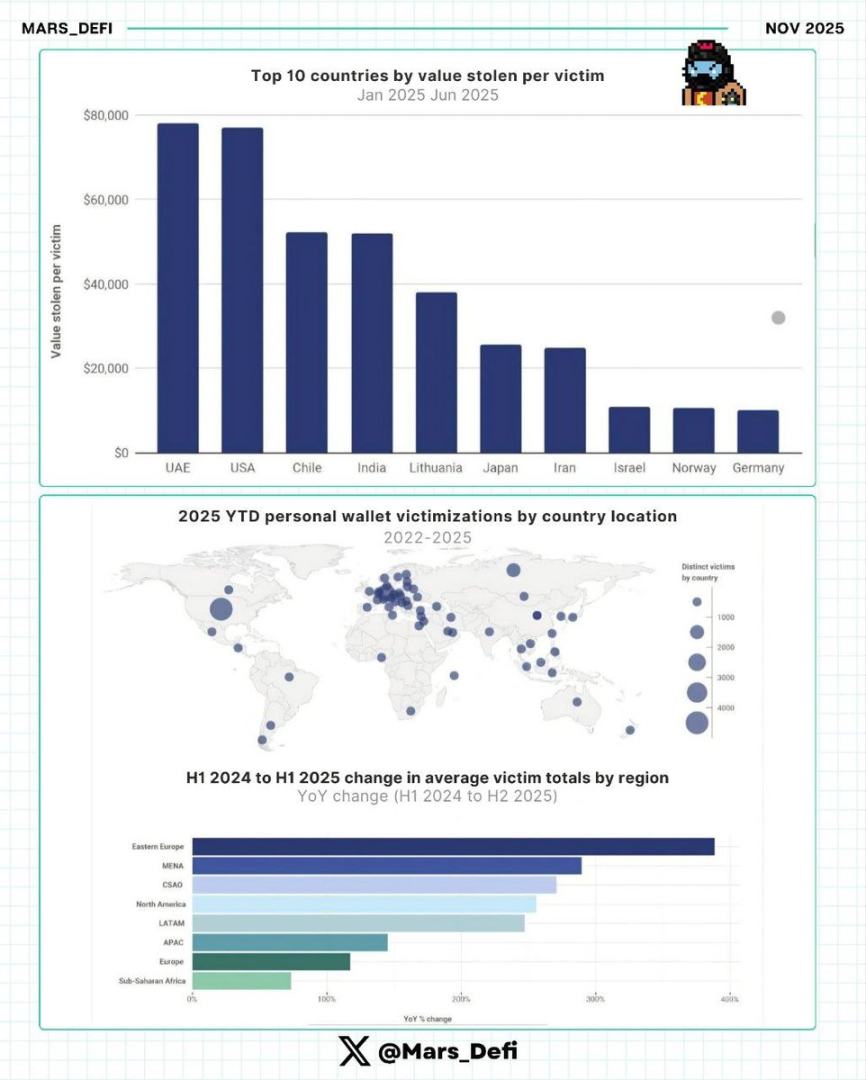The Geographic Map of Crypto Scams: From Silicon Valley to Mumbai, Fraud Knows No Borders
41% are from Asia and 28% are from North America; regional labels are purely misleading.
41% from Asia, 28% from North America—the regional labels are pure lies.
Written by: Mars_DeFi
Translated by: Chopper, Foresight News
In the early days of cryptocurrency development, many believed that scams were an inevitable price of innovation, and that "rug pulls" or "exit scams" were limited to a handful of bad actors in the unregulated corners of the internet.
But over the years, independent investigative journalists like ZachXBT have gradually uncovered a disturbing truth: cryptocurrency scams have long since gone global.
Between 2022 and 2025 alone, ZachXBT recorded 118 different types of financial fraud cases, ranging from multi-million dollar NFT rug pulls to complex cross-chain money laundering networks. His investigative reports have exposed scammers from every continent: from Memecoin projects endorsed by Silicon Valley influencers, to Telegram scam groups in Mumbai, and pump-and-dump gangs in Istanbul.
The consistency of the data is shocking: no country or region is immune from scammers.
The Myth of Regional Scammers
The recently added location display feature on social platform X was intended to enhance transparency, but it has sparked discussions related to xenophobia.
Many users have started attacking others based on the account's country of origin, especially targeting accounts related to India, Nigeria, and Russia, labeling all people from these countries as "scammers."
But ZachXBT's investigations tell a completely different story. Here is a brief summary of ZachXBT's investigative data from the past three years:
Among the 118 verified scam cases:
- About 41% originated from Asia (India, China, Southeast Asia)
- About 28% originated from North America
- About 15% originated from Europe
- About 10% involved Africa
- About 6% were untraceable due to mixers or privacy coins, with anonymous identities
The regional distribution of scammers in these 118 reports is also noteworthy:

Regional distribution of cryptocurrency scammers identified by ZachXBT
The data does not reveal a problematic region, but rather a global moral deficiency.
The above data exposes a key fact often overlooked in online discussions: although Africans (especially Nigerians) are frequently and unfairly labeled as cryptocurrency scammers, the reality is quite the opposite.
This indicates that cryptocurrency scams are not limited to any one region, but are a global issue that transcends borders, languages, and cultures.
A Macro Perspective on Cryptocurrency Scams

1) Countries with the Highest Amount Stolen per Victim (January 2025 to June 2025)
For those who blindly accuse Nigeria or India, the first chart is shocking enough. The top 10 countries with the highest average amount stolen per victim are:
- UAE — about $78,000
- USA — about $77,000
- Chile — about $52,000
- India — about $51,000
- Lithuania — about $38,000
- Japan — about $26,000
- Iran — about $25,000
- Israel — about $12,000
- Norway — about $12,000
- Germany — about $11,000
Notice? Nigeria is not on this list at all, while the UAE, USA, several European countries, and several Asian countries are prominently featured.
If those stereotypes were true, Nigeria or India should top this list, but that's not the case.
2) Global Map of Wallet Victims (2022-2025)
When we broaden the perspective to the total number of victims worldwide, the geographic distribution becomes even clearer. Victims are spread across North America, South America, Europe, the Middle East and North Africa, and Asia.
Regions with a high number of victims include: Western and Eastern Europe, North America, parts of Asia, the Middle East, and North Africa.
What about Africa? Compared to Europe, the Americas, and Asia, the total number of victim wallets in Africa is much lower. This is not my subjective judgment, but an objective fact presented by the map.
3) Regions with the Fastest Growth in Cryptocurrency Scam Victims (Year-on-Year, 2024-2025)
The third chart shows the regions with the fastest growth in scams, with year-on-year victim growth rates as follows:
- Eastern Europe — about 380%
- Middle East and North Africa — about 300%
- Central/South Asia and Oceania — about 270%
- North America — about 230%
- Latin America — about 200%
- Asia-Pacific — about 140%
- Europe (overall) — about 120%
- Sub-Saharan Africa — about 100%
Again, Africa ranks at the bottom in terms of growth rate. Meanwhile:
- Europe and the Middle East and North Africa lead the world in victim growth
- North America and Latin America follow closely behind
- The Asia-Pacific region and the area including India are at a moderate level
- Africa is the least affected region in the entire dataset
If Nigeria were the global scam center, Africa would not be at the bottom of this ranking.
The truth is: cryptocurrency scams are not a problem of Nigeria or India, but a global issue.
The data completely shatters the stereotypes:
- The countries with the highest amount stolen per victim are not in Africa or India
- The regions with the fastest scam growth are not in Africa or India
- Africa has the lowest year-on-year growth rate of victims
So, why are Nigerians and Indians unfairly labeled as "scammers"? Because people often judge by emotion rather than evidence; because a single viral scam in a region becomes a collective label for 200 million people, and online prejudice spreads much faster than the truth.
According to the data:
- Nigeria is not among the high-loss countries.
- Africa has the lowest growth in scam victims.
- Europe and North America have worse statistics.
- Asian regions such as the UAE and India face extremely high-value theft cases.
If a region had the most scammers, then the victim situation in that region would also be severe (scammers operate where they are familiar). But Africa and India show no such pattern at all.
If Nigerians and Indians generalized like others, they could easily point fingers at Europe, the USA, South America, the Middle East, and North Africa.
But they don't, because responsible people understand: scammers are everywhere—present in every race, every region, every country; victims are also found worldwide; no group should be labeled because of the actions of a few criminals.
Recent posts by @TheQuartering and others criticizing "Indian scammers" (x.com/TheQuartering/status/1992098997281194375) fully demonstrate how xenophobia exploits people's real pain. Portraying an entire country or community as criminals only deepens the harm.
ZachXBT's investigations have also exposed scams by American YouTube bloggers, European DeFi developers, and Asian marketing groups. Cryptocurrency scams are not determined by nationality, but are the result of unchecked anonymity, greed, and regulatory neglect.
How Can We Do Better?
For cryptocurrency to mature, it needs not only regulation, but also a collective moral reshaping. Specifically, we can start with the following:
- Replace nationality bias with transparency: require project founders to undergo public audits, complete KYC, and disclose on-chain information, rather than making judgments based on nationality.
- Support investigative journalism: investigators like ZachXBT and small detective communities have already helped prevent millions of dollars in potential losses. We should spread their work, not nationalist noise.
- Always remain cautious: treat every project as a potential scam until proven reliable.
- Report, don’t ridicule: when you find suspicious accounts, use verification channels or reporting resources, rather than spreading hate.
Summary
Cryptocurrency was born out of ideals of decentralization and freedom, but in the absence of accountability mechanisms, these ideals have been distorted into tools of global exploitation. Every region has scammers, and every region has victims. Let’s put an end to “on-chain xenophobia.”
Disclaimer: The content of this article solely reflects the author's opinion and does not represent the platform in any capacity. This article is not intended to serve as a reference for making investment decisions.
You may also like
Robinhood to Launch Futures and Derivatives Exchange as Prediction Markets Surge

Reliance Global Shifts Entire Crypto Treasury Into Zcash After Strategic Overhaul

Kevin Hassett Emerges as Trump’s Leading Candidate for Federal Reserve Chair

Chainlink Co-Founder Sergey Nazarov Predicts Regulation-Driven Surge in Global Adoption

